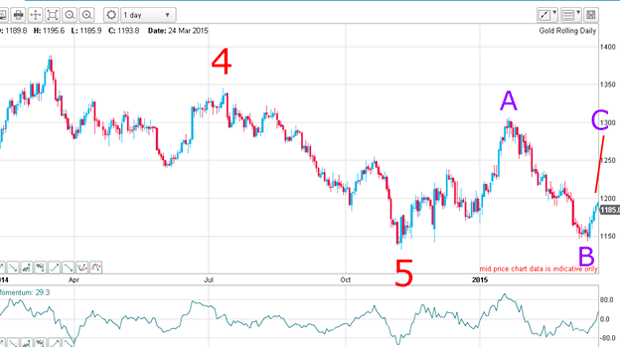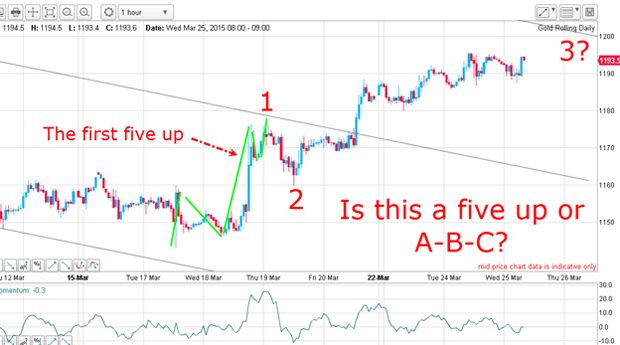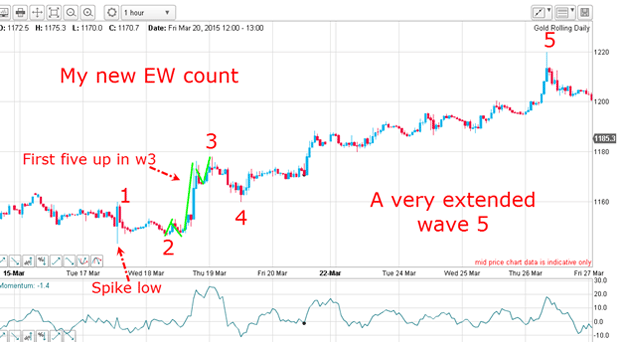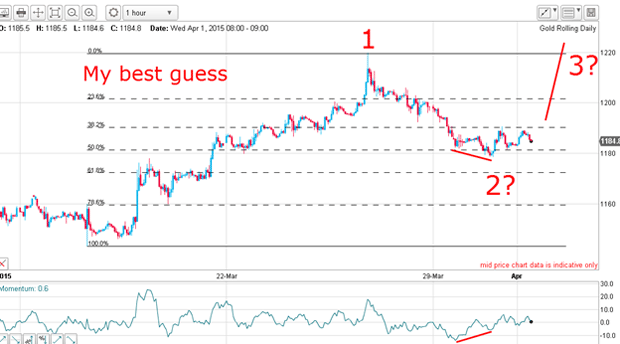Gold looks tricky at the moment, but I’m predicting a rapid rise
Gold has entered a critical phase in the charts, says John C Burford – and everything is pointing to a strong move up.
Get the latest financial news, insights and expert analysis from our award-winning MoneyWeek team, to help you understand what really matters when it comes to your finances.
You are now subscribed
Your newsletter sign-up was successful
Want to add more newsletters?

Twice daily
MoneyWeek
Get the latest financial news, insights and expert analysis from our award-winning MoneyWeek team, to help you understand what really matters when it comes to your finances.

Four times a week
Look After My Bills
Sign up to our free money-saving newsletter, filled with the latest news and expert advice to help you find the best tips and deals for managing your bills. Start saving today!
Since my last poston gold of 25 March, the market has entered a most interesting period and I believe will go down as a defining aspect of the developing wave structure.
Basically, the pattern so far is consistent with the market being at the forefront of a large wave up, which should carry beyond the $1,300 area and possibly much higher.
In a typical five-wave motive pattern, each of the five waves has a unique characteristic that helps us identify them as they develop. I have dwelt at length on third waves; these are usually very strong (showing extremes of momentum along their path), and are usually the longest wave in the sequence (but not always).
MoneyWeek
Subscribe to MoneyWeek today and get your first six magazine issues absolutely FREE

Sign up to Money Morning
Don't miss the latest investment and personal finances news, market analysis, plus money-saving tips with our free twice-daily newsletter
Don't miss the latest investment and personal finances news, market analysis, plus money-saving tips with our free twice-daily newsletter
The other four waves also have attributes that can help verify your labels as they are in motion.
Of course, it is easy to identify the waves in hindsight, but learning to recognise a particular wave as it is being made is a valuable skill. It's not too difficult a skill to master, provided you know what you are looking for.
Let me illustrate this in gold.
Gold was hard to interpret, but there will still opportunities to make profits
The reason I could make that forecast was simply that, according to the Elliott wave rules, after the five-wave motive decline off the all-time high in 2011, the market will trace out a three-wave upward correction, hopefully in an A-B-C form.

Back in November, I did not know precisely how the waves would develop. But as I outlined over the winter months, I managed to extract significant profits on the A wave rally. In February during the downturn I was less active, but managed to catch the spike low of 17 March and position long at the $1,160 area, which is my current position.
In my 25 March post, I outlined how I took partial profits near the rally high at $1,220 according to my split-bet strategy.
That was how I left it last week and I have been looking for another long entry since then in order to reinstate my full long position.
Naturally, this operation is tricky how do I judge the most opportune time to enter on the dip? Enter too soon, and a loss looms. Wait too long and I miss the opportunity.
In the C wave rally starting at the spike low of 17 March, we have complete sub-waves up to the $1,220 high. So, what do they tell us?
The stand-out clue that the spike low on 17 March was the end of the B wave decline was the clear five up. Remember, a motive small-scale five waves up is one of my most reliable indicators for a change in trend.
This is the hourly chart I showed last time:

I also put in my tentative labels on the rally. So let's see how that has panned out. Here is the updated chart to the recent high:

Now, wave 1 is the first upward push off the spike low. The dip but not to a new low is my wave 2, and the first five up is contained in my wave 3. The extended rally is my new wave 5. Although wave 3 is not the longest, it does sport the highest momentum reading and thus qualifies.
The bears are gathering but I think gold's heading up
So, I had a rather unconventional complete larger five up to $1,220 what could I expect on the decline? Naturally, a three-wave move to a Fibonacci level, probably the 50% or even the 62% correction of the entire rally off the spike low.
I was at the point where I could venture that the larger pattern would turn out to be a five up with wave 1 at the $1,220 high, and wave 2 down to follow. Provided this wave 2 showed the normal characteristics of a second wave, my case would be strong.
So let's see how that is working out:

Second waves are characterised by a disbelief in the new uptrend and usually speculative investors sell into this wave. This should be apparent when the next Commitment of Traders (COT) data is released on Friday. Also, I have noted several strongly bearish articles recently.
There is a small A-B-C at the bottom of wave 2 with a large positive-momentum divergence and a move to the Fibonacci 50% level, as I was hoping for.
That was an ideal place for me to place a long trade because a tight stop could be employed using my 3% rule.
If this scenario is correct, I expect a rapid move up in a large wave 3. Remember, third waves are normally long and strong and with bearish sentiment remaining elevated, a short squeeze will likely accomplish this.
If I do not see a rapid move up in the next few days, then there may be more work to do in wave 2 before wave 3 gets into gear.
Get the latest financial news, insights and expert analysis from our award-winning MoneyWeek team, to help you understand what really matters when it comes to your finances.
John is is a British-born lapsed PhD physicist, who previously worked for Nasa on the Mars exploration team. He is a former commodity trading advisor with the US Commodities Futures Trading Commission, and worked in a boutique futures house in California in the 1980s.
He was a partner in one of the first futures newsletter advisory services, based in Washington DC, specialising in pork bellies and currencies. John is primarily a chart-reading trader, having cut his trading teeth in the days before PCs.
As well as his work in the financial world, he has launched, run and sold several 'real' businesses producing 'real' products.
-
 Can mining stocks deliver golden gains?
Can mining stocks deliver golden gains?With gold and silver prices having outperformed the stock markets last year, mining stocks can be an effective, if volatile, means of gaining exposure
-
 8 ways the ‘sandwich generation’ can protect wealth
8 ways the ‘sandwich generation’ can protect wealthPeople squeezed between caring for ageing parents and adult children or younger grandchildren – known as the ‘sandwich generation’ – are at risk of neglecting their own financial planning. Here’s how to protect yourself and your loved ones’ wealth.